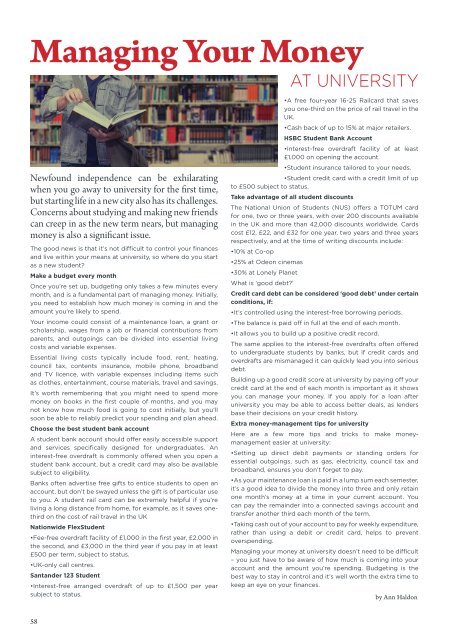I and A Mag Oct19
Telford Magazine
Telford Magazine
Create successful ePaper yourself
Turn your PDF publications into a flip-book with our unique Google optimized e-Paper software.
Managing Your Money<br />
AT UNIVERSITY<br />
Newfound independence can be exhilarating<br />
when you go away to university for the first time,<br />
but starting life in a new city also has its challenges.<br />
Concerns about studying <strong>and</strong> making new friends<br />
can creep in as the new term nears, but managing<br />
money is also a significant issue.<br />
The good news is that it’s not difficult to control your finances<br />
<strong>and</strong> live within your means at university, so where do you start<br />
as a new student?<br />
Make a budget every month<br />
Once you’re set up, budgeting only takes a few minutes every<br />
month, <strong>and</strong> is a fundamental part of managing money. Initially,<br />
you need to establish how much money is coming in <strong>and</strong> the<br />
amount you’re likely to spend.<br />
Your income could consist of a maintenance loan, a grant or<br />
scholarship, wages from a job or financial contributions from<br />
parents, <strong>and</strong> outgoings can be divided into essential living<br />
costs <strong>and</strong> variable expenses.<br />
Essential living costs typically include food, rent, heating,<br />
council tax, contents insurance, mobile phone, broadb<strong>and</strong><br />
<strong>and</strong> TV licence, with variable expenses including items such<br />
as clothes, entertainment, course materials, travel <strong>and</strong> savings.<br />
It’s worth remembering that you might need to spend more<br />
money on books in the first couple of months, <strong>and</strong> you may<br />
not know how much food is going to cost initially, but you’ll<br />
soon be able to reliably predict your spending <strong>and</strong> plan ahead.<br />
Choose the best student bank account<br />
A student bank account should offer easily accessible support<br />
<strong>and</strong> services specifically designed for undergraduates. An<br />
interest-free overdraft is commonly offered when you open a<br />
student bank account, but a credit card may also be available<br />
subject to eligibility.<br />
Banks often advertise free gifts to entice students to open an<br />
account, but don’t be swayed unless the gift is of particular use<br />
to you. A student rail card can be extremely helpful if you’re<br />
living a long distance from home, for example, as it saves onethird<br />
on the cost of rail travel in the UK<br />
Nationwide FlexStudent<br />
•Fee-free overdraft facility of £1,000 in the first year, £2,000 in<br />
the second, <strong>and</strong> £3,000 in the third year if you pay in at least<br />
£500 per term, subject to status.<br />
•UK-only call centres.<br />
Sant<strong>and</strong>er 123 Student<br />
•Interest-free arranged overdraft of up to £1,500 per year<br />
subject to status.<br />
•A free four-year 16-25 Railcard that saves<br />
you one-third on the price of rail travel in the<br />
UK.<br />
•Cash back of up to 15% at major retailers.<br />
HSBC Student Bank Account<br />
•Interest-free overdraft facility of at least<br />
£1,000 on opening the account.<br />
•Student insurance tailored to your needs.<br />
•.Student credit card with a credit limit of up<br />
to £500 subject to status.<br />
Take advantage of all student discounts<br />
The National Union of Students (NUS) offers a TOTUM card<br />
for one, two or three years, with over 200 discounts available<br />
in the UK <strong>and</strong> more than 42,000 discounts worldwide. Cards<br />
cost £12, £22, <strong>and</strong> £32 for one year, two years <strong>and</strong> three years<br />
respectively, <strong>and</strong> at the time of writing discounts include:<br />
•10% at Co-op<br />
•25% at Odeon cinemas<br />
•30% at Lonely Planet<br />
What is ‘good debt?’<br />
Credit card debt can be considered ‘good debt’ under certain<br />
conditions, if:<br />
•It’s controlled using the interest-free borrowing periods.<br />
•The balance is paid off in full at the end of each month.<br />
•It allows you to build up a positive credit record.<br />
The same applies to the interest-free overdrafts often offered<br />
to undergraduate students by banks, but if credit cards <strong>and</strong><br />
overdrafts are mismanaged it can quickly lead you into serious<br />
debt.<br />
Building up a good credit score at university by paying off your<br />
credit card at the end of each month is important as it shows<br />
you can manage your money. If you apply for a loan after<br />
university you may be able to access better deals, as lenders<br />
base their decisions on your credit history.<br />
Extra money-management tips for university<br />
Here are a few more tips <strong>and</strong> tricks to make moneymanagement<br />
easier at university:<br />
•Setting up direct debit payments or st<strong>and</strong>ing orders for<br />
essential outgoings, such as gas, electricity, council tax <strong>and</strong><br />
broadb<strong>and</strong>, ensures you don’t forget to pay.<br />
•As your maintenance loan is paid in a lump sum each semester,<br />
it’s a good idea to divide the money into three <strong>and</strong> only retain<br />
one month’s money at a time in your current account. You<br />
can pay the remainder into a connected savings account <strong>and</strong><br />
transfer another third each month of the term.<br />
•Taking cash out of your account to pay for weekly expenditure,<br />
rather than using a debit or credit card, helps to prevent<br />
overspending.<br />
Managing your money at university doesn’t need to be difficult<br />
– you just have to be aware of how much is coming into your<br />
account <strong>and</strong> the amount you’re spending. Budgeting is the<br />
best way to stay in control <strong>and</strong> it’s well worth the extra time to<br />
keep an eye on your finances.<br />
by Ann Haldon<br />
58










